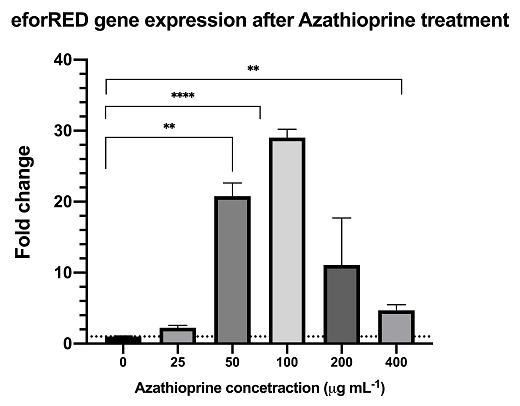Part:BBa_K3071009
Phage shock protein F transcriptional activation domain fused with Clp (pspF TAD-Clp)
Description
This is the protein-encoding gene for the Phage shock protein F transcriptional activation domain fused with cAMP receptor-like protein (pspF TAD - Clp), which is a composite part constructed by (BBa_K3071004), (BBa_K3071008), and (BBa_K3071007). This part is codon-optimized to express in express in Escherica coli Bl21(DE3) strain. The western blot data of this composite part shows it could be correctly expressed in E.coli.
Biology

PspF (BBa_K3071006)has a hexameric structure, with α/β and α domains in each monomer (figure 1). It has ATPase activity in E. Coli to promote DNA strand separation, forming the open complex. Loop 1 (L1) and loop 2 (L2) are two loops locate in the α/β domains and α domains respectively. They are responsible for the interaction between PspF and the sigma 54. The 8 to 238 amino acids are the Sigma 54 interactive domain while the DNA strand binding motif is at the amino acid position 302 to 321.
C reactive protein-like protein (Clp) (BBa_K3071004) is a global transcriptional regulator that regulates virulence factors production by activating or repressing the expression of a large set of genes in the diffusible signal factor DSF pathway. It also regulates the genes that involve in extracellular polysaccharide (EPS) synthesis, flagellum synthesis, protein, and fatty acid metabolism, multidrug resistance, iron uptake. They also regulate genes that encoding extracellular enzymes, membrane components, and a few transcription factors.
Usage

The DNA binding domain in the C-terminus of pspF (BBa_K3071006) is replaced by the Clp to construct this fusion transcription activator for our reporter construct (BBa_K3071024). This transcription activator can activate the CBSI & II -regulated pspA promoter (BBa_K3071014) upon the diffusible signal factor (DSF) appears.
Characterization

Clone was induced by 1mM IPTG at 32℃ and collected at different time points, which are 12hr, 16hr, 20hr, 24hr, and 28hr. After blotting with corresponding antibodies, pspF TAD-Clp was confirmed with successful expression at all time points. Results of blots probing Clp-pspF showed that clones collected at 12hr contained the highest amount of target proteins and the protein quantity decreased from 16hr to 28hr. This may due to degradation inside the cells.

Azathioprine is an indirect supressor to cyclic-di-GMP, treatment of azathioprine to bacteria culture can reduce the cyclic-di-GMP level and lead to activation of the pspF-Clp and by-pass the RpfC/RpfG two-component system.The result from rt-qPCR data shows that the above synthetic biological system is functional with significant up-regulation of reporter mRNA.

The result from rt-qPCR data shows that the above synthetic biological system is functional with significant up-regulation of reporter mRNA upon DSF activation.
Sequence and Features
- 10INCOMPATIBLE WITH RFC[10]Illegal XbaI site found at 907
- 12COMPATIBLE WITH RFC[12]
- 21INCOMPATIBLE WITH RFC[21]Illegal BglII site found at 910
- 23INCOMPATIBLE WITH RFC[23]Illegal XbaI site found at 907
- 25INCOMPATIBLE WITH RFC[25]Illegal XbaI site found at 907
Illegal NgoMIV site found at 985
Illegal AgeI site found at 90
Illegal AgeI site found at 118
Illegal AgeI site found at 256 - 1000COMPATIBLE WITH RFC[1000]
| None |
